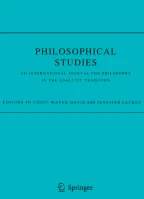Abstract
I think that there are good reasons to adopt a relativist semantics for epistemic modal claims such as ``the treasure might be under the palm tree'', according to which such utterances determine a truth value relative to something finer-grained than just a world (or a <world, time> pair). Anyone who is inclined to relativise truth to more than just worlds and times faces a problem about assertion. It's easy to be puzzled about just what purpose would be served by assertions of this kind, and how to understand what we'd be up to in our use of sentences like ``the treasure might be under the palm tree'', if they have such peculiar truth conditions. After providing a very quick argument to motivate a relativist view of epistemic modals, I bring out and attempt to resolve this problem in making sense of the role of assertions with relativist truth conditions. Solving this problem should be helpful in two ways: first, it eliminates an apparently forceful objection to relativism, and second, spelling out the relativist account of assertion and communication will help to make clear just what the relativist position is, exactly, and why it's interesting.
Similar content being viewed by others
References
DeRose, K. (1991). Epistemic possibilities. Philosophical Review, 100, 581–605.
Egan, A., Hawthorne, J. & Weatherson, B. (forthcoming) In Preyer & Peters (Eds.), Epistemic modals in context, contextualism in philosophy. Oxford University Press, Oxford.
Hacking, I. (1967). Possibility. Philosophical Review, 76, 143–68.
Lasersohn, P. (MS) Context dependence, disagreement, and predicates of personal taste.
Lewis, D. (1979). Attitudes De Dicto and De Se. Philosophical Review, 88, 513–543.
MacFarlane, J. (forthcoming a) Epistemic modalities and relative truth.
MacFarlane, J. (forthcoming b) The assessment sensitivity of knowledge attributions, forthcoming in Oxford studies in epistemology. Oxford University Press.
Perry, J. (1979). The problem of the essential indexical. Nous, 13, 3–21.
Stalnaker, R. (1978). Assertion. Syntax and Semantics, 9, 315–332.
Acknowledgments
Thanks to Brian Weatherson, John Hawthorne, Daniel Stoljar, Frank Jackson, Ben Blumson, Seth Yalcin, Karen Bennett, Kent Bach, Matthew Weiner, Jonathan Kvanvig, Eric Swanson, David Chalmers, Agustin Rayo, Dustin Locke, Aaron Bronfman, Michael Allers, Ivan Mayerhofer, and to the participants at the BSPC 2005 for helpful discussion.
Author information
Authors and Affiliations
Corresponding author
Additional information
Thanks to Brian Weatherson, John Hawthorne, Daniel Stoljar, Frank Jackson, Ben Blumson, Seth Yalcin, Karen Bennett, Kent Bach, Matthew Weiner, Jonathan Kvanvig, Eric Swanson, David Chalmers, Agustin Rayo, Dustin Locke, Aaron Bronfman, Michael Allers, Ivan Mayerhofer, and to the participants at the BSPC 2005 for helpful discussion.
Rights and permissions
About this article
Cite this article
Egan, A. Epistemic modals, relativism and assertion. Philos Stud 133, 1–22 (2007). https://doi.org/10.1007/s11098-006-9003-x
Published:
Issue Date:
DOI: https://doi.org/10.1007/s11098-006-9003-x
